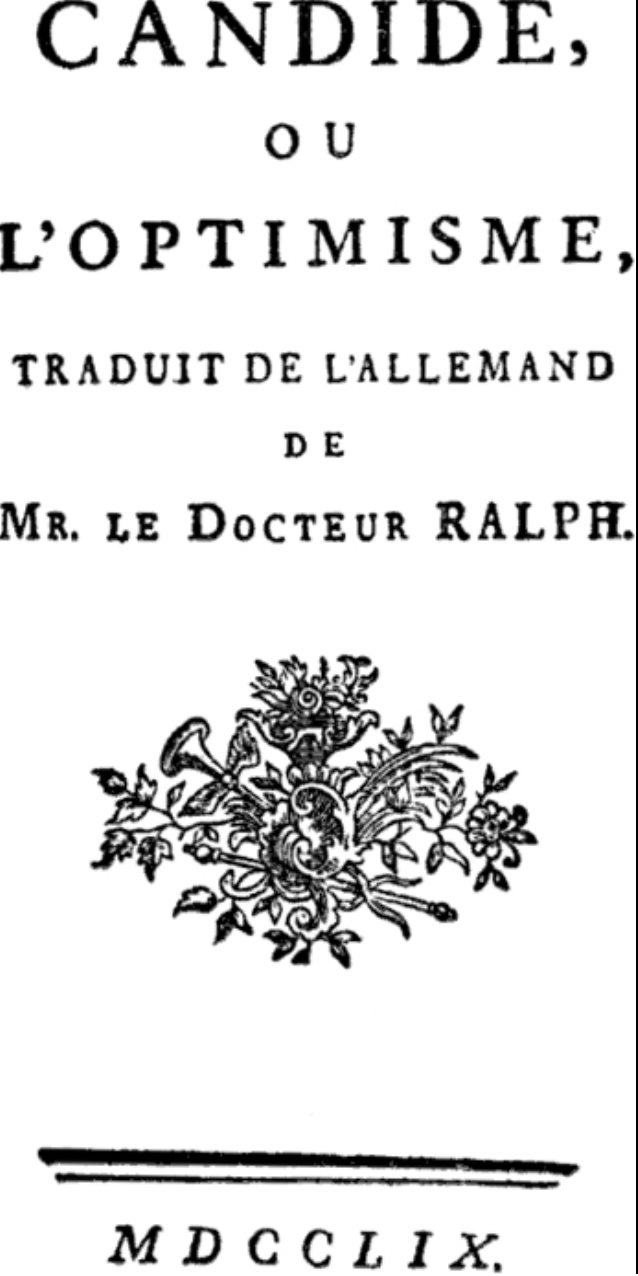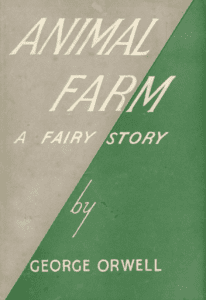Author: Voltaire, pen name of François-Marie Arouet, a French writer, historian, and philosopher of the 18th century.
Written famously in three days using a pseudonym anticipating the subsequent ban in several countries, this mid-eighteenth-century French satire spares nobody. It ridicules everything from philosophies to governments to religions. It paints grotesque stereotypes of characters and situations in a way that even tragedies become hilarious, ironic, or absurd.
Candide, as his name suggests, is an innocent young man, living in German Baron Thunder-Ten-Tronckh’s palace in Westphalia, rumored to be his sister’s child by a local gentleman she did not marry as he has only seventy-one quarterings against her seventy-two. This insurmountable class difference gets Candide ejected from the palace when he falls for the Baron’s daughter Cunegonde.
Candide soon doubts this is the best of all possible worlds and there is sufficient reason for everything, as taught by his tutor Pangloss, a metaphysician of Leibnitz’s school of optimism. Recruited in the Bulgarian army, he receives four-thousand whippings when he takes a long walk assuming all humans are free to walk. War teaches Candide that cannons and bayonets are sufficient reason for the death of thousands; laws of war allow old men and children to be massacred, and women to be disemboweled after satisfying natural wants of soldiers.
Candide escapes war finding shelter with James, the Anabaptist, in Holland, where Pangloss is a beggar hideous with venereal disease, traced back to Columbus’s sailors, contracted from Baron’s maid Paquette. Cunegonde and her family have been slain by Bulgarians. Pangloss, cured and employed by James, and Candide, accompany James to Lisbon. James drowns saving a sailor in a tempest, who does not help. Pangloss prevents Candide from saving James, postulating the Bay of Lisbon is made on purpose to drown James.
Shipwrecked Candide and Pangloss reach Lisbon ravaged by earthquake. Jews, heretics, and foreigners are burnt alive by the Inquisition in an auto-da-fé, to stop the earthquake. Pangloss is hanged, burning being impossible in rain, and Candide whipped. An old woman takes Candide to Cunegonde, who survived disemboweling, was kept by a Bulgarian Captain, sold to rich villainous Jew Don Issachar, who shares her with the Grand Inquisitor. Candide kills both Cunegonde’s masters when they alternately visit, escaping with the women.
They are robbed by a Grey Friar at an inn, and Candide joins an army sailing to fight Jesuits in Paraguay. Cunegonde’s old servant recounts her misfortunes. She is the daughter of a Pope and princess; her affianced prince murdered and their ship captured by pirates. Raped and sold in Morocco during a bloody civil war, her mother quartered by Moors, she survives plague in Algiers; resold repeatedly from Tunis to Constantinople. In the fort of the Aga of Janissaries besieged by Russians, the soldiers eat one of her buttocks. Russians take her to Moscow, and subsequently she becomes a servant in numerous cities, ending with Cunegonde.
At Buenos Ayres, the Governor propositions Cunegonde; Candide fleeing from arrest for killing the Inquisitor, with his quarter-Spaniard valet, – the resourceful Cacambo; who takes Candide to Jesuits in Paraguay. Candide is overjoyed to find reverend Commandant is Cunegonde’s brother. The Jesuit father burying him in Westphalia found him still alive, and developed an attachment for the pretty boy. Candide kills the Baron as he refuses to let Candide marry Cunegonde, escaping wearing his clothes.
Candide shoots two monkeys chasing women, but realizes the monkeys are their sweethearts. They are captured by Oreillons, – cannibals detesting Jesuits; released as they killed a Jesuit. Traversing forests and rivers, they reach El Dorado, where gold and precious stones abound, along with peace and happiness. Candide leaves this paradise with a hundred pack-sheep; losing most on precipitous mountains, reaching Surinam with only two.
Meeting an amputee slave of merchant Vanderdendur, Candide learns hands are amputated when fingers are caught in sugarcane mills, and legs of deserters amputated. Candide sends Cacambo to ransom Cunegonde, sailing to Europe to avoid arrest. Vanderdendour promises Candide a passage but treacherously steals his two sheep; Candide being fined on complaining to the magistrate.
Selecting Martin, the pessimist Manichean, as travel-companion among many candidates, Candide sails to France. Martin believes neither hawk nor man has ever changed their character. When Vanderdendur’s ship is attacked and destroyed near them, Candide recovers one sheep. Naive gullible Candide is duped in Paris by Abbé of Perigord, who takes Candide to a lady of quality, and to an imposter posing as an ailing Cunegonde. They escape being arrested as foreigners, traveling to Venice to await Cacambo and Cunegonde, via England, where an admiral is executed.
Martin thinks Cacambo has absconded with Candide’s money. They encounter Paquette, whose experiences of rape and prostitution reinforce Martin’s claim that all is misery and illusion. Martin wagers that Paquette and her companion Friar Giroflée are unhappy, though appearing merry. Giroflée was forced into the monastery by his parents and detests it. Candide gifts them money. They visit the nobleman Pococurante who apparently looks contented, but finds him indifferent or critical towards wealth, art and literature.
Cacambo appears as a servant to one of six dethroned monarchs visiting Venice during the Carnival, with whom Candide dines. Candide sails with Cacambo’s Sultan to Constantinople, where Cunegonde and her old woman now wash dishes for an exiled Transylvanian prince. Buying Cacambo’s freedom, Candide sails to Cunegonde in a galley, two of the galley slaves being Pangloss and the Baron, whom Candide frees. The Baron, revived by a surgeon, was enslaved for bathing naked with a Mussulman, Pangloss for returning a dropped bouquet to a woman in a mosque. After his hanging, Pangloss was dissected by a surgeon and found alive.
Cunegonde is now ugly and Candide marries her merely as an obligation. Her brother objects and is sent back to the galley. Paquette and Giroflée join them on the farm having squandered Candide’s money. All are unhappy except Martin, who proclaims man lives in distracting inquietude or lethargic disgust. On meeting a farmer who lives in peace by cultivating his garden, they give up philosophical musings and work hard at the farm according to their individual talents.




